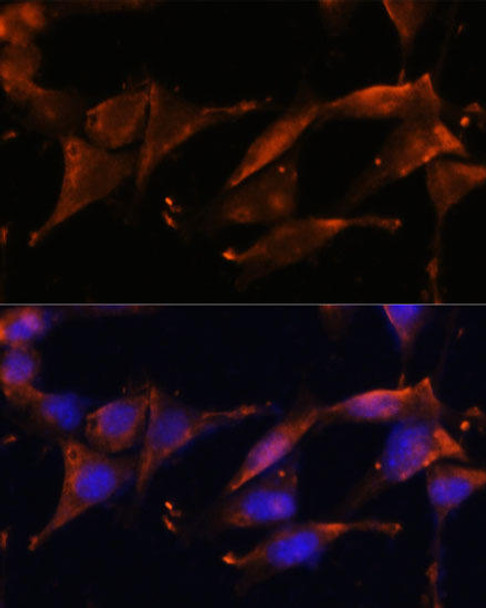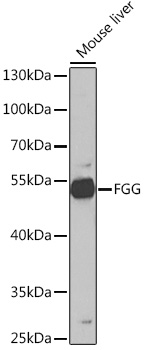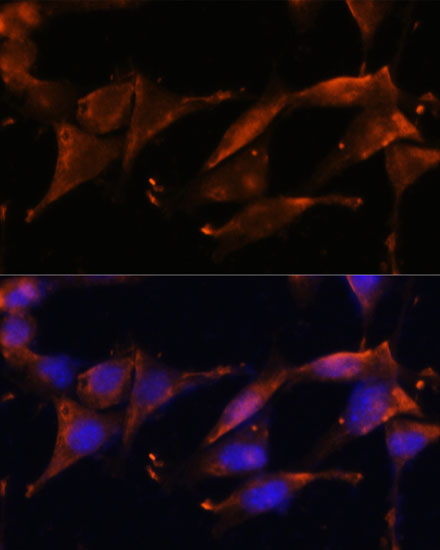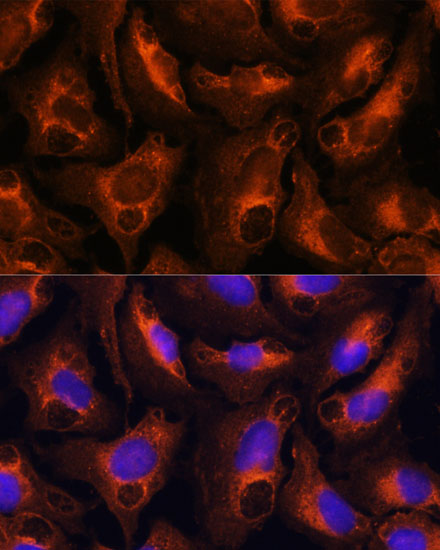Cardiovascular Antibodies
Anti-FGG Antibody (CAB5642)
- SKU:
- CAB5642
- Product Type:
- Antibody
- Reactivity:
- Human
- Reactivity:
- Mouse
- Host Species:
- Rabbit
- Isotype:
- IgG
- Antibody Type:
- Polyclonal Antibody
- Research Area:
- Cardiovascular
Description
| Antibody Name: | Anti-FGG Antibody |
| Antibody SKU: | CAB5642 |
| Antibody Size: | 20uL, 50uL, 100uL |
| Application: | WB IF |
| Reactivity: | Human, Mouse |
| Host Species: | Rabbit |
| Immunogen: | Recombinant fusion protein containing a sequence corresponding to amino acids 50-330 of human FGG (NP_000500.2). |
| Application: | WB IF |
| Recommended Dilution: | WB 1:500 - 1:2000 IF 1:50 - 1:200 |
| Reactivity: | Human, Mouse |
| Positive Samples: | Mouse liver |
| Immunogen: | Recombinant fusion protein containing a sequence corresponding to amino acids 50-330 of human FGG (NP_000500.2). |
| Purification Method: | Affinity purification |
| Storage Buffer: | Store at -20'C. Avoid freeze / thaw cycles. Buffer: PBS with 0.02% sodium azide, 50% glycerol, pH7.3. |
| Isotype: | IgG |
| Sequence: | GIAD FLST YQTK VDKD LQSL EDIL HQVE NKTS EVKQ LIKA IQLT YNPD ESSK PNMI DAAT LKSR KMLE EIMK YEAS ILTH DSSI RYLQ EIYN SNNQ KIVN LKEK VAQL EAQC QEPC KDTV QIHD ITGK DCQD IANK GAKQ SGLY FIKP LKAN QQFL VYCE IDGS GNGW TVFQ KRLD GSVD FKKN WIQY KEGF GHLS PTGT TEFW LGNE KIHL ISTQ SAIP YALR VELE DWNG RTST ADYA MFKV GPEA DKYR LTYA YFAG GDAG DAFD GFDF GDDP SDKF F |
| Gene ID: | 2266 |
| Uniprot: | P02679 |
| Cellular Location: | Secreted |
| Calculated MW: | 49kDa/51kDa |
| Observed MW: | 52kDa |
| Synonyms: | FGG |
| Background: | The protein encoded by this gene is the gamma component of fibrinogen, a blood-borne glycoprotein comprised of three pairs of nonidentical polypeptide chains. Following vascular injury, fibrinogen is cleaved by thrombin to form fibrin which is the most abundant component of blood clots. In addition, various cleavage products of fibrinogen and fibrin regulate cell adhesion and spreading, display vasoconstrictor and chemotactic activities, and are mitogens for several cell types. Mutations in this gene lead to several disorders, including dysfibrinogenemia, hypofibrinogenemia and thrombophilia. Alternative splicing results in transcript variants encoding different isoforms. |
| UniProt Protein Function: | FGG: Fibrinogen has a double Function: yielding monomers that polymerize into fibrin and acting as a cofactor in platelet aggregation. Defects in FGG are a cause of congenital afibrinogenemia (CAFBN). This rare autosomal recessive disorder is characterized by bleeding that varies from mild to severe and by complete absence or extremely low levels of plasma and platelet fibrinogen. Patients with congenital fibrinogen abnormalities can manifest different clinical pictures. Some cases are clinically silent, some show a tendency toward bleeding and some show a predisposition for thrombosis with or without bleeding. 2 isoforms of the human protein are produced by alternative splicing. |
| UniProt Protein Details: | Protein type:Secreted, signal peptide; Secreted Chromosomal Location of Human Ortholog: 4q28 Cellular Component: extracellular space; cell surface; fibrinogen complex; extracellular region; plasma membrane; cell cortex; external side of plasma membrane Molecular Function:protein binding, bridging; metal ion binding; cell adhesion molecule binding; structural molecule activity; receptor binding Biological Process: protein polymerization; platelet activation; extracellular matrix organization and biogenesis; positive regulation of heterotypic cell-cell adhesion; platelet degranulation; cellular protein complex assembly; positive regulation of protein secretion; cell-matrix adhesion; positive regulation of vasoconstriction; response to calcium ion; blood coagulation; signal transduction; positive regulation of exocytosis Disease: Afibrinogenemia, Congenital; Dysfibrinogenemia, Congenital |
| NCBI Summary: | The protein encoded by this gene is the gamma component of fibrinogen, a blood-borne glycoprotein comprised of three pairs of nonidentical polypeptide chains. Following vascular injury, fibrinogen is cleaved by thrombin to form fibrin which is the most abundant component of blood clots. In addition, various cleavage products of fibrinogen and fibrin regulate cell adhesion and spreading, display vasoconstrictor and chemotactic activities, and are mitogens for several cell types. Mutations in this gene lead to several disorders, including dysfibrinogenemia, hypofibrinogenemia and thrombophilia. Alternative splicing results in two transcript variants encoding different isoforms. [provided by RefSeq, Jul 2008] |
| UniProt Code: | P02679 |
| NCBI GenInfo Identifier: | 20178280 |
| NCBI Gene ID: | 2266 |
| NCBI Accession: | P02679.3 |
| UniProt Secondary Accession: | P02679,P04469, P04470, Q53Y18, Q96A14, Q96KJ3, Q9UC62 Q9UC63, Q9UCF3, A8K057, |
| UniProt Related Accession: | P02679 |
| Molecular Weight: | 49,497 Da |
| NCBI Full Name: | Fibrinogen gamma chain |
| NCBI Synonym Full Names: | fibrinogen gamma chain |
| NCBI Official Symbol: | FGG |
| NCBI Protein Information: | fibrinogen gamma chain; fibrinogen, gamma polypeptide |
| UniProt Protein Name: | Fibrinogen gamma chain |
| Protein Family: | Fibrinogen |
| UniProt Gene Name: | FGG |
| UniProt Entry Name: | FIBG_HUMAN |









